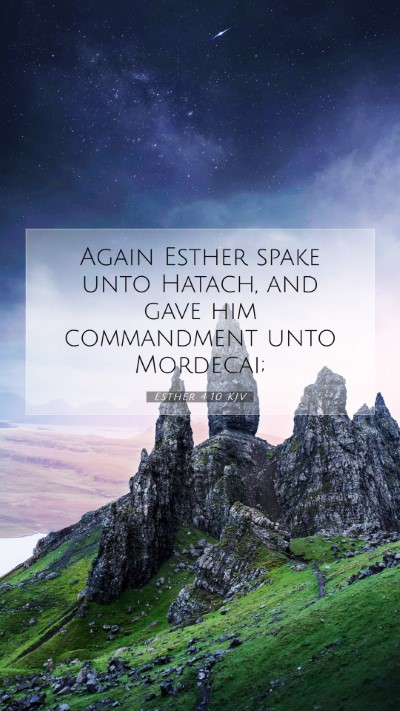Old Testament
Genesis Exodus Leviticus Numbers Deuteronomy Joshua Judges Ruth 1 Samuel 2 Samuel 1 Kings 2 Kings 1 Chronicles 2 Chronicles Ezra Nehemiah Esther Job Psalms Proverbs Ecclesiastes Song of Solomon Isaiah Jeremiah Lamentations Ezekiel Daniel Hosea Joel Amos Obadiah Jonah Micah Nahum Habakkuk Zephaniah Haggai Zechariah MalachiEsther 4:10 Meaning
What is the meaning of Esther 4:10?
Again Esther spake unto Hatach, and gave him commandment unto Mordecai;
Esther 4:10 Bible Verse Meaning
Understanding Esther 4:10
Esther 4:10 states: "Again Esther spake unto Hathach, and gave him commandment unto Mordecai." This verse is part of a critical moment in the Book of Esther, showcasing Esther’s communication with Mordecai regarding the dire situation faced by the Jewish people. To grasp its significance, let’s delve into the meanings and interpretations gathered from several public domain commentaries.
Bible Verse Explanations
This verse highlights Esther's role as a mediator. She is responding to Mordecai’s earlier request for her to intervene with the king on behalf of the Jewish people. Her command to Hathach, a royal eunuch, reflects the urgency of their situation and the fear surrounding it.
Matthew Henry's Commentary
According to Matthew Henry, this verse shows Esther's initial hesitance to approach the king due to the law that prohibited anyone from entering the king's presence without being summoned. Nevertheless, her willingness to communicate with Mordecai illustrates her resolve to act even amidst tremendous fear.
Albert Barnes' Notes
Albert Barnes points out that Esther, despite her royal position, was deeply aware of the risks involved in acting on behalf of her people. This verse serves as a reminder that leadership often requires confronting fears and undertaking difficult tasks for the benefit of others.
Adam Clarke's Commentary
Adam Clarke emphasizes the importance of communication in this passage. Esther's directive shows her strategic thinking and the necessity of aligning her plans with Mordecai’s counsel. It also signifies the importance of trust and collaboration in times of crisis.
Key Themes and Insights
- Mediation and Advocacy: Esther acts as an advocate for her people.
- Courage and Fear: The inner turmoil and outer courage displayed by Esther.
- Community and Communication: Importance of working together for a common cause.
Application of Esther 4:10
For modern readers, Esther 4:10 provides profound lessons in courage, the impact of individual actions within a community, and the importance of communication in leadership. It calls upon us to reflect on how we can act as advocates for others, even in the face of fear.
Cross References
- Esther 4:13-14 - Mordecai's encouragement to Esther.
- Esther 5:1-2 - Esther approaching the king.
- Esther 4:16 - Esther's declaration of fasting and prayer.
- Psalm 34:4 - Seeking help in times of fear.
- Hebrews 4:16 - Approaching the throne of grace with confidence.
Conclusion
Esther 4:10 serves as a profound reminder of the weight of responsibility that leaders carry, the importance of community in times of crisis, and the courage required to stand up for one's beliefs and values. This scripture calls each reader to examine how they can apply these lessons within their lives.


